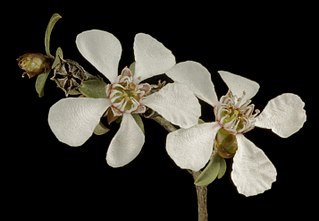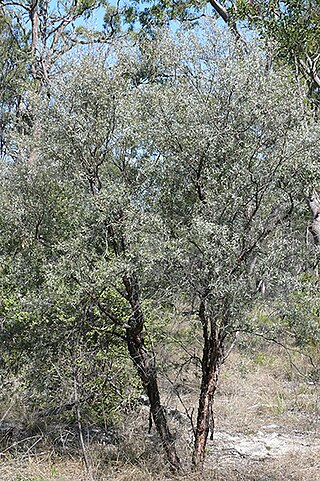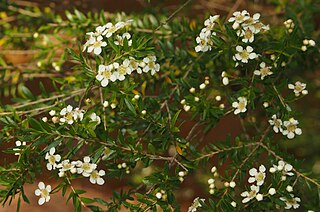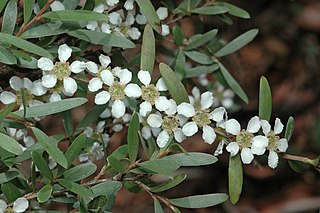
Leptospermum petersonii, commonly known as lemon-scented teatree, is a species of shrub or small tree that is endemic to eastern Australia. It has thin, fibrous or flaky bark, often strongly-scented elliptic to lance-shaped leaves, white flowers and fruit that are retained for several years. It is commonly grown as an ornamental and is regarded as a minor environmental weed in some areas.

Gaudium trinervium, commonly known as flaky-barked tea-tree, slender tea-tree or paperbark tree, is a species of shrub or small tree that is endemic to eastern Australia. It has papery bark that is shed in thin, flaking layers, narrow elliptic to broadly egg-shaped leaves with the narrower at the base, white flowers and silky-hairy fruit that falls from the plant when mature.

Leptospermum spectabile is a species of shrub that is endemic to a small area of New South Wales. It has thin bark, narrow elliptic leaves, dark red flowers arranged singly on short side shoots and relatively large fruit.

Leptospermopsis erubescens, commonly known as the roadside tea tree, is a species of shrub that is endemic to southwest of Western Australia. It has thin, fibrous bark, egg-shaped leaves, small white flowers and woody fruit.

Gaudium coriaceum, commonly known as green tea-tree or mallee teatree, is a shrub species that is endemic to south-eastern and south-central Australia. It has smooth bark on the younger stems, elliptic to narrow egg-shaped leaves, white flowers and woody fruit. The usual habitat is mallee on sand dunes.

Gaudium multicaule, commonly known as the silver tea-tree, is a species of shrub that is endemic to south eastern Australia. It has linear, narrow elliptical or narrow egg-shaped leaves, white or pink flowers usually borne singly on short side shoots, and fruit the falls from the plant soon after the seeds are released.

Gaudium deanei, commonly known as Deane's tea-tree, is a species of rare, slender shrub that is endemic to the northern suburbs of Sydney. It has bark peeling in long strips from the older stems, hairy young stems, narrow elliptical to lance-shaped leaves, white flowers arranged singly on short side shoots and mostly glabrous fruit.
Leptospermum amboinense is a species of tree that is native to Malesia and North Queensland. It has rough bark, sessile, narrow elliptical leaves, white flowers and sessile, conical to hemispherical fruit.

Gaudium blakelyi is a species of shrub that is endemic to rocky clifftops near Lithgow in New South Wales. It has densely silky young stems, egg-shaped to elliptical leaves and white or pink flowers.

Gaudium brevipes, commonly known as the slender tea-tree, is a species of shrub or small tree that is endemic to eastern Australia. It has fibrous bark on the main stems, smooth bark on young stems, narrow elliptical to narrow egg-shaped leaves, white flowers and hemispherical fruit that is shed when mature.

Gaudium divaricatum is a species of plant that is endemic to inland New South Wales. It is an erect or weeping shrub with compact fibrous bark, elliptical to egg-shaped leaves, white flowers arranged singly on short axillary side shoots and woody fruit that fall off when mature.

Gaudium lamellatum is a species of shrub or small tree that is endemic to inland Queensland and has distinctive reddish, layered bark. It has narrow elliptical leaves, white flowers and small fruit that fall from the plant when mature.

Gaudium namadgiense is a species of small shrub that is endemic to areas near the border between New South Wales and the Australian Capital Territory. It has silky-hairy, narrow lance-shaped to elliptical leaves, usually white flowers borne singly or in pairs on short side shoots, and fruit that falls from the plant shortly after the seeds are released.

Leptospermum neglectum is a shrub or small tree that is endemic to Queensland. It has elliptical leaves that are silky-hairy at first, white flowers on short shoots in leaf axils and fruit with the remnants of the sepals attached but that fall from the plant shortly after the seeds are released.
Aggreflorum pallidum is a species of spreading shrub that is endemic to Queensland. It has thin, firm, rough bark, narrow lance-shaped leaves, white flowers arranged in groups of two or three on side shoots and fruit that remains on the plant until it dies.

Gaudium polyanthum is a rigid, spreading shrub or small tree that is endemic to New South Wales. It has thin, rough bark, young stems that are hairy at first, elliptical leaves, relatively small white flowers and fruit are shed when the seeds are mature.

Gaudium semibaccatum is a species of low, dense shrub that is endemic to eastern Australia. It has egg-shaped to narrow elliptical leaves with a blunt tip, white or pink flowers and hairy, flat-topped fruit that falls from the plant shortly after the seeds are released. It grows in poorly-drained soil in coastal heath.

Gaudium sericatum is a species of erect shrub that is endemic to Queensland. It has thin, firm bark, narrow egg-shaped to elliptical leaves, white or pink flowers arranged usually singly on side shoots and fruit that falls from the plant when the seeds are released.

Gaudium subglabratum is a species of open shrub that is endemic to a south-eastern New South Wales. It has thin, rough bark, egg-shaped to lance-shaped leaves with the narrower end towards the base, white flowers arranged singly on short side shoots and relatively small fruit that falls from the plant at maturity.

Leptospermum variabile is a species of shrub that is endemic to eastern Australia. It has thin, rough or scaly bark, broadly elliptical to lance-shaped leaves with the narrower end towards the base, white flowers arranged singly on the ends of short side branches, and woody fruit that remains on the plant when mature.

















